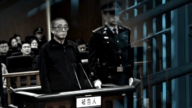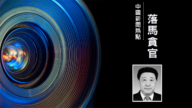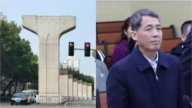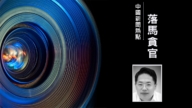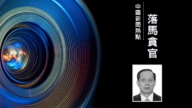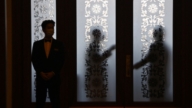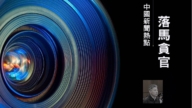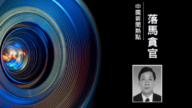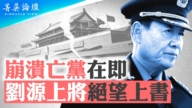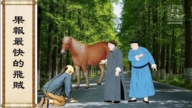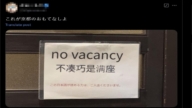【新唐人2014年12月13日訊】日前,中共規定,中紀委向中共7大中央一級機構,派駐紀檢組進行監督和調查。這在中共歷史上尚屬首次。不過,也引發外界對中紀委至上的擔憂。有評論指出,中共當今這種反腐的辦法,能夠達到一定的效果,但是由於中共的高層機構一直缺乏監督,萬一發生腐敗,有又誰可以來監督他們?
12月11號,中共出臺了《關於加強中央紀委派駐機構建設的意見》,決定逐步統一向中辦、國辦、人大、組織部、宣傳部、統戰部、政協等7大中央一級機關派駐紀檢組,監督這些部門的中共領導。派駐機構將覆蓋全部中共中央一級黨和國家機關。
這是中共歷史上首次由中紀委向黨的工作部門和人大機關、政協機關派駐紀檢組。這些派駐的紀檢組直接由中紀委領導,發現重要問題向中紀委報告;初步核實反映所駐部門領導及中管幹部的問題線索;受理對所駐部門人員的檢舉、控告。
《亞洲新聞週刊》總監黃金秋:「短期內是有效的,不能建立一個長期的反貪機制,在中共這種缺乏監督的環境之中,權力尋租的空間很大,這些紀檢官員會不會和這些要害部門的領導互相勾結,假如這些派出機構腐敗,中紀委該怎麼辦,中紀委書記換成其他人,他腐敗了怎麼辦,習近平能保證將來擔任他這個職位的人,也像他那樣有反貪的決心和清廉的家風嗎?不可能做到。」
據黨媒報導,在140多家中共的一級黨和國家機關中,中紀委的派駐機構,加上新增的7大機關,將達到60個。
新出臺的《意見》則著力為中紀委派駐機構樹立權威。《意見》規定,派駐的紀檢組與駐在部門是監督與被監督的關係,對所駐部門機關紀委和直屬單位、省級垂管單位的紀檢工作進行指導檢查等。
派駐機構負責人可以參加或列席所駐部門的領導會議,經批准可查閱或複製所駐部門的有關文件、資料、財務賬目等材料;還可對有關領導的材料進行查閱和調查核實;派駐機構提出的意見和建議,所駐部門無正當理由的應當採納。另外,派駐機構負責人還可約談所駐部門管理的幹部。
而在前一陣中共的反腐運動中,被中紀委約談後,官員跳樓的事件時有發生。
黃金秋:「紀委不是司法機構,它可以把一個官員直接帶走,失去自由,是不是也沒有符合依法治國的概念,當然我們也不能求全責備,但是更長遠來講,我希望習近平先生、王岐山先生能夠真正從對國家有利的角度,把反貪納入國家法律體系內,而不是用一個黨來代替國家,代替國法。」
《亞洲新聞週刊》總監黃金秋指出,如果要想實現制度性反腐,必須擁有新聞自由,和健全的民主機制。
大陸時政評論員陳明慧:「在未來的中國,如果中國的民主自由憲政走向一個光明健康正常的國家的話,那個時候貪污腐敗都不是甚麼大的問題,迫害人權,迫害信仰團體,迫害民主人士異議人士手上累累的血債,必須徹底清算,中國才可能有條件,有基礎走向政治清明。」
大陸時政評論員陳明慧認為,目前中紀委進駐中共的最高層機關,還是屬於「習江鬥」的一部分。
時事評論員夏小強也向美國《大紀元新聞網》表示,中紀委進駐七部門,其實主要的目標是人大和中宣部,其餘的都是陪襯。因中共政治局常委張德江和劉雲山掌控的人大與中宣部,是江派在檯面上對抗習近平的主要機構。
黃金秋指出,中共的最高層一直缺乏監督,腐敗必然極其嚴重,不過,黨內反腐不可能達到清廉,必須有民眾參與,黨外監督。
採訪編輯/劉惠 後製/葛雷
Central Anti-Corruption Inspection Teams Now Stationed in 7 Core Sectors
The Chinese Communist Party (CCP) recently had its Central Discipline Inspection Commission (CDIC) send inspection teams to monitor and investigate 7 central level organizations. It’s the first time the CCP has done this. But it also caused worries in society. Comments say the current anti-corruption method of the CCP has had some effect. However since the high level officials of the CCP have had no supervision, who can monitor them if there’s corruption?
On Dec. 11, the CCP issued a plan to dispatch inspection teams to 7 central level sections. These included the Central Office, Station Council, National People’s Congress, Central Organization Department; Central Propaganda Department, Central United Front Work, and, The office of Chinese peoples’ Political Consultative Conference. The inspection is to supervise the communist leaders of those organizations, the plan says. The inspection teams will cover the entire central organizations of the party and state.
It’s the first time in CCP history that the CDIC has sent an inspection team to party departments, NPC sectors, and the CPPCC sectors. The inspection teams are directly instructed by the CDIC. All important discoveries will be reported to the CDIC. The CDIC will confirm the issues of the reported leaders, and receives reports and complaints to staff in the offices.
Huang Jinqiu, director of Asian News Weekly, “It’s effective in the short term, but it can’t establish a long term anti-corruption mechanism. The CCP has been lacking a supervised environment, and there’s a lot of room for abuse of power. Would the inspection team officials collude with leaders in those core sectors? What if the inspection organization is corrupt? What if the secretary of the CDIC is corrupt? How could [president] Xi Jinping guarantee his successor would be as determined to fight against corruption as him? It’s impossible."
Party media reported that from over 140 party and state organizations, the central inspection teams have stationed in 60, including the newly inspected 7 core sectors.
The new plan is to establish authority of the CDIC’s inspection teams. The plan says inspection teams and stationed organizations is to supervise and being supervised. The inspection teams gives instruction and inspection to the stationed organizations and the units under them.
The inspection team managers are allowed to participate in leadership meetings of the inspected sectors. They are allowed to review all the documents, financial accounts etc. of the inspected sectors with permissions. They can also inspect and investigate material from leaders. The inspected sectors must unconditionally accept all comments and suggestions made by the inspection teams. The inspection team manager can also interview every cadre at management level of all departments.
Official suicides often happened after interviews by the CDIC during the previous anti-corruption campaign.
Huang Jinqiu, “The CDIC is not a judicial body. It can directly take an official away, removing his freedom. Is it not applying the rule of law? Of course, we can’t demand perfection, but for long term, I hope Mr. Xi Jinping and Mr. Wang Qishan can truly think from the vantage point of the state, to include anti-corruption in the national legal system. The party can’t take place of the nation and the law."
Huang indicated that to realize institutional anti-corruption, China must have press freedom and democratic mechanism.
Chen Minghui, mainland Chinese political commentator, “In the future, if China becomes a normal healthy country with democracy and liberal constitutionalism, corruption won’t be a big issue. It must completely eliminate the persecution of human rights, of faith groups, and democratic dissidents. Only then, can China have the foundation to have a bright future."
Chen believes that the inspection of the CCP’s top level organizations is part of the struggle between Xi and Jiang.
Political commentator Xia Xiaoqiang told U.S. based Epoch Times that the main targets of the plan are the National People’s Congress and the Propaganda department. The rest are just add-ons. CCP Politburo Standing Committee members Zhang Dejiang and Liu Yunshan control the NPC and the Propaganda Department, which are major organizations under Jiang’s faction to fight against Xi Jinping.
Huang pointed out that the CCP top level has always lacked supervision, and the corruption is certainly serious. But the anti-corruption campaign inside the party can’t work unless citizens can participate to provide outside supervision.
Interview & Edit/LiuHui Post-production/GeLei



